#mental healthcare is healthcare
Link
Speaking as someone who lives with mental illness, who struggled and suffered for decades with undiagnosed and unacknowledged CPTSD, with a side of Depression and Generalized Anxiety, (who continues to struggle and live with it) I know how difficult and scary a mental health crisis can be.
I also know how vicious and ruthless and cruel the political world is.
So I am incredibly grateful to Senator Fetterman for getting mental health care without shame or apology. His courage saved lives. There are people today and in the coming days who are willing to seek mental health care, because he spoke openly and without shame about his own mental health.
Depression and mental illness affects EVERYONE, and when people who have enormous public profiles speak about their experiences, it chips away at the stigma that has claimed too many lives.
I am not a United States Senator, but I know this is absolutely true, because people have told me that my public journey to care for my mental health and heal my trauma gave them what they needed to make the appointment and begin their own journey.
My heart is with Senator Fetterman and his family. I wish them all the best. I know how tough this is. How scary it can be. How Depression will see the struggle and just pour lie after lie after lie over you, trying its best to make you believe you deserve or are responsible for it.
All of that is bullshit. Depression lies.
I want to remind anyone who is struggling with their mental health, who is just *so tired* of feeling all the things Depression and its buddies try to drown us with that IT IS OKAY TO NOT BE OKAY. It's not shameful or weak to ask for help. It's courageous, and you deserve to be helped by people who have dedicated their lives to helping us get better.If you or someone you know is struggling, please know that help is available when you're ready. If you are in the United States, you can dial 988 from any phone to speak with a counselor who is ready for you.
#depression#mental health#john fetterman#end the stigma#mental healthcare is healthcare#mental illness is not weakness
1K notes
·
View notes
Text



Starting Saturday, July 16, every person in every community nationwide can dial “988” to reach trained crisis counselors who can help in a mental health, substance use or suicide crisis.
988 is the new three-digit dialing code in the US connecting people to the existing National Suicide Prevention Lifeline (now the 988 Suicide and Crisis Lifeline) — whether that is thoughts of suicide, mental health or substance use crisis, or any other kind of emotional distress. People can also dial 988 if they are worried about a loved one who may need crisis support.
You can reach the 988 Suicide and Crisis Line by calling 988, texting 988 or chatting via Lifeline’s website.
Visit NAMI’s Website or 988 FAQs to learn more
47 notes
·
View notes
Text
I need somebody to be proud of me for overcoming my executive dysfunction/mental illness enough to make a dentist appointment for next week. I haven’t been to a dentist in about 10 years due to my stupid defective brain and this is a real accomplishment in my mind. Now that the appointment is made I’m so excited to go and am convinced that it will lead to life changing healthcare. Nobody in my real life understands how this makes me feel and I’m really craving a little validation.
#healthcare#mental health#mental healthcare is healthcare#executive dysfunction#depression#anxiety#small victories#pls validate me
4 notes
·
View notes
Text
reblog if you think these are all valid reasons for a student or an employee to take a day off from their school or their job without their grades or paycheck being affected in any way:
- period cramps
- exhaustion, be it mental or physical
- depression, anxiety, and other mental health related issues
#mental health#mental health awareness#mental health support#mental health issues#student#students#education#education system#politics#positivity#self love#self care#important psa#psa#academia#healthcare#hygiene#health and wellness#school#student life
2K notes
·
View notes
Text
pro tip for disabled people (especially autistic people) that i just realized after literal years of chronic illness...
when a health professional asks how you're doing, it's not small talk. they want to know how your health has been. do not reply "good." if you seem them for chronic pain, talk about your pain. if you see them for mental health, tell them how you've been feeling. etc. etc. again... don't reply "good." jump right into it and be honest about your health.
#softspoonie#disabled#disability#mentally ill#mental illness#autistic#autism#autism spectrum#chronic illness#chronically ill#chronic pain#spoonie#spoonie tips#healthcare
4K notes
·
View notes
Text
The young woman was catatonic, stuck at the nurses’ station — unmoving, unblinking and unknowing of where or who she was.
Her name was April Burrell.
Before she became a patient, April had been an outgoing, straight-A student majoring in accounting at the University of Maryland Eastern Shore. But after a traumatic event when she was 21, April suddenly developed psychosis and became lost in a constant state of visual and auditory hallucinations. The former high school valedictorian could no longer communicate, bathe or take care of herself.
April was diagnosed with a severe form of schizophrenia, an often devastating mental illness that affects approximately 1 percent of the global population and can drastically impair how patients behave and perceive reality.
“She was the first person I ever saw as a patient,” said Sander Markx, director of precision psychiatry at Columbia University, who was still a medical student in 2000 when he first encountered April. “She is, to this day, the sickest patient I’ve ever seen.”
It would be nearly two decades before their paths crossed again. But in 2018, another chance encounter led to several medical discoveries reminiscent of a scene from “Awakenings,” the famous book and movie inspired by the awakening of catatonic patients treated by the late neurologist and writer Oliver Sacks.
Markx and his colleagues discovered that although April’s illness was clinically indistinguishable from schizophrenia, she also had lupus, an underlying and treatable autoimmune condition that was attacking her brain.
After months of targeted treatments — and more than two decades trapped in her mind — April woke up.
The awakening of April — and the successful treatment of other peoplewith similar conditions — now stand to transform care for some of psychiatry’s sickest patients, many of whom are languishing in mental institutions.
Researchers working with the New York state mental health-care system have identified about 200 patients with autoimmune diseases, some institutionalized for years, who may be helped by the discovery.
And scientists around the world, including Germany and Britain, are conducting similar research, finding that underlying autoimmune and inflammatory processes may be more common in patients with a variety of psychiatric syndromes than previously believed.
Although the current research probably will help only a small subset of patients,the impact of the work is already beginning to reshape the practice of psychiatry and the way many cases of mental illness are diagnosed and treated.
“These are the forgotten souls,” said Markx. “We’re not just improving the lives of these people, but we’re bringing them back from a place that I didn’t think they could come back from.”
– A catatonic woman awakened after 20 years. Her story may change psychiatry.
#block JavaScript in site settings if article is paywalled#April burrel#disability#schizophrenia#lupus#mental illness#catatonia#chronic illness#institutionalization#psychiatry#medical science#healthcare#autoimmune disease#Washington post#knee of huss
3K notes
·
View notes
Text
By: Beth Bourne
Published: Feb 27, 2024
Kaiser gender specialists were eager to approve hormones and surgeries, which would all be covered by insurance as “medically necessary.”
On September 6, 2022, I received mail from my Kaiser Permanente Davis Ob-Gyn reminding me of a routine cervical screening. The language of the reminder stood out to me: “Recommended for people with a cervix ages 21 to 65.” When I asked my Ob-Gyn about this strange wording, she told me the wording was chosen to be “inclusive” of their “transgender” and “gender fluid” patients.
Based on this response, several thoughts occurred to me. Could I expose the medical scandal of “gender-affirming care” by saying and doing everything my daughter and other trans-identifying kids are taught to do? Would there be the type of medical safeguarding and differential diagnosis we would expect in other fields of medicine, or would I simply be allowed to self-diagnose and be offered the tools (i.e. hormones and surgeries) to choose my own gender adventure and become my true authentic self?
If I could demonstrate that anyone suffering from delusions of their sex, self-hatred, or identity issues could qualify for and easily obtain body-altering hormones and surgeries, all covered by insurance as “medically necessary” and potentially “life-saving” care, then maybe people would finally wake up. I certainly had.
I was prepared for failure. I wasn’t prepared for how easy success would be.
* * *
I am a 53-year-old mom from Davis, CA. My daughter began identifying as a transgender boy (social transition) and using he/him pronouns at school during 8th grade. Like several of her peers who also identified as trans at her school, my daughter was a gifted student and intellectually mature but socially immature. This shift coincided with her school’s sudden commitment to, and celebration of, a now widespread set of radical beliefs about the biology of sex and gender identity.
She “came out” as trans to her father (my ex-husband) and me through a standard coming-out letter, expressing her wish to start puberty blockers. She said she knew they were safe, citing information she had read from Planned Parenthood and the World Professional Association for Transgender Health (WPATH). To say I was shocked would be an understatement. I was also confused because this announcement was sudden and unexpected. While others quickly accepted and affirmed my daughter’s new identity, I was apprehensive and felt the need to learn more about what was going on.
Events began escalating quickly.
During a routine doctor’s visit scheduled for dizziness my daughter said that she was experiencing, the Kaiser pediatrician overheard her father using “he/him” pronouns for our daughter. The pediatrician seemed thrilled, quickly asking my daughter about her “preferred pronouns” and updating her medical records to denote that my daughter was now, in fact, my son. The pediatrician then recommended we consult the Kaiser Permanente Oakland Proud pediatric gender clinic, where she could get further information and (gender affirming) “treatment.” Now I was the one feeling dizzy.
As I began educating myself on this issue, I discovered that this phenomenon—minors, most often teen girls, suddenly adopting trans identities—was becoming increasingly widespread. It even had a name: rapid onset gender dysphoria, or ROGD. Thankfully, after learning about the potential side-effects of blockers and hormones, my ex-husband and I managed to agree not to consent to any medical interventions for our daughter until she turned 18 and would then be able to make such decisions as an adult.
Over the past five years, my daughter’s identity has slowly evolved in ways that I see as positive. Our bond, however, has become strained, particularly since I began publicly voicing my concerns about what many term as “gender ideology.” Following my daughter’s 17th birthday family celebration, she sent me an email that evening stating she would be cutting off contact with me.
While this estrangement brought me sorrow, with my daughter living full-time with her father, it also gave me the space to be an advocate/activist in pushing back on gender identity ideology in the schools and the medical industry.
I decided to go undercover as a nonbinary patient to show my daughter what danger she might be putting herself in—by people who purport to have her health as their interest, but whose main interest is in medically “affirming” (i.e., transitioning) whoever walks through their door. I am at heart a mother protecting her child.
* * *
My daughter’s sudden decision to become a boy was heavily on my mind in early September of 2022, when mail from my Kaiser Permanente Davis Ob-Gyn reminded me of a routine cervical screening with “Recommended for people with a cervix ages 21 to 65.” I was told that the wording was chosen to be “inclusive” of transgender and “gender fluid” patients.
Throughout the whole 231-day process of my feigned gender transition, the Kaiser gender specialists were eager to serve me and give me what I wanted, which would all be covered by insurance as “medically necessary.” My emails were returned quickly, my appointments scheduled efficiently, and I never fell through the cracks. I was helped along every step of the way.
Despite gender activists and clinicians constantly claiming that obtaining hormones and surgeries is a long and complex process with plenty of safety checks in place, I was in full control at every checkpoint. I was able to self-diagnose, determine how strong a dose of testosterone I received and which surgeries I wanted to pursue, no matter how extreme and no matter how many glaring red flags I purposefully dropped. The medical workers I met repeatedly reminded me that they were not there to act as “gatekeepers.”
I was able to instantly change my medical records to reflect my new gender identity and pronouns. Despite never being diagnosed with gender dysphoria, I was able to obtain a prescription for testosterone and approval for a “gender-affirming” double mastectomy from my doctor. It took only three more months (90 days) to be approved for surgery to remove my uterus and have a fake penis constructed from the skin of my thigh or forearm. Therapy was never recommended.
Critics might dismiss my story as insignificant on the grounds that I am a 53-year-old woman with ample life experience who should be free to alter her body. However, this argument for adult bodily autonomy is a standard we apply to purely cosmetic procedures like breast implants, liposuction, and facelifts, not “medically necessary” and “lifesaving” treatments covered by health insurance. Or interventions that compromise health and introduce illness into an otherwise healthy body. And especially not for children.
My story, which I outline in much more detail below, should convince any half-rational person that gender medicine is not operating like any other field of medicine. Based on a radical concept of “gender identity,” this medical anomaly preys upon the body-image insecurities common among pubescent minors to bill health insurance companies for permanent cosmetic procedures that often leave their patients with permanently altered bodies, damaged endocrine systems, sexual dysfunction, and infertility.
* * *
Detailed Timeline of Events
On October 6, 2022, I responded to my Ob-Gyn’s email to tell her that, after some thought, I’d decided that maybe the label “cis woman” didn’t truly reflect who I was. After all, I did have some tomboyish tendencies. I told her I would like my records to be changed to reflect my newly realized “nonbinary” identity, and that my new pronouns were they/them. I also voiced my desire to be put in touch with an endocrinologist to discuss starting testosterone treatment.
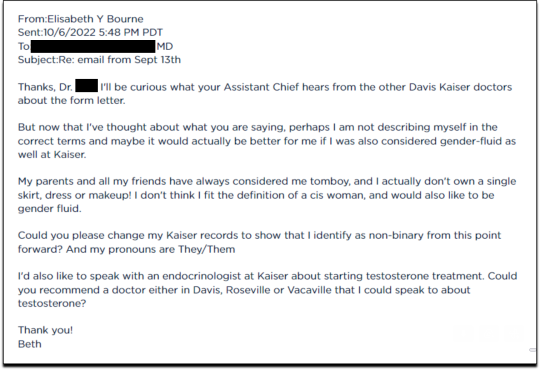
Fifteen minutes later I received an email from another Kaiser doctor informing me that my medical records had been changed, and that once my primary doctor returned to the office, I’d be able to speak with her about hormone therapy.
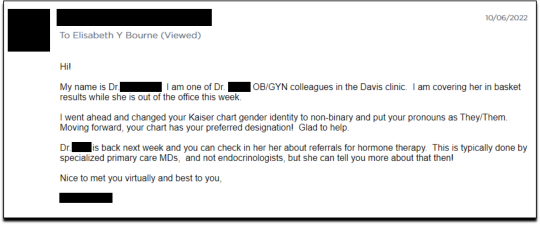
I responded the following day (October 7, 2022), thanking her for changing my records, and asking if she could connect me with someone who could help me make an appointment for “top surgery” (i.e., a cosmetic double mastectomy) because my chest binder was rather “uncomfortable after long days and playing tennis.”
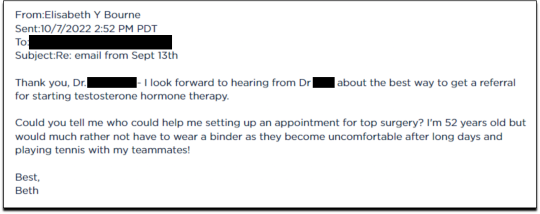
She told me to contact my primary care MD to “get things rolling,” and that there were likely to be “preliminary evaluations.”

Six days after contacting my primary care MD for a referral, I received an email from one of Kaiser’s gender specialists asking me to schedule a phone appointment so she could better understand my goals for surgery, so that I could get “connected to care.” This call to review my “gender affirming treatment options and services” would take 15-20 minutes, after which I would be “booked for intake,” allowing me to proceed with medical transition.
This wasn’t an evaluation of whether surgical transition was appropriate, it was simply a meeting for me to tell them what I wanted so that they could provide it.
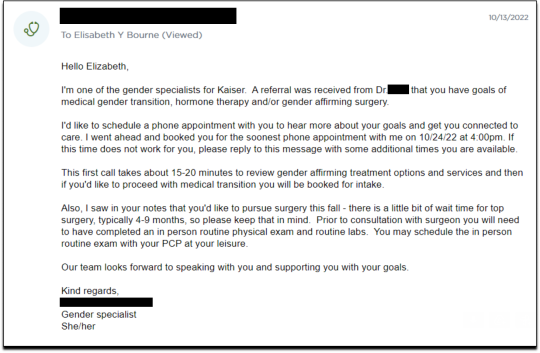
On October 18, I had my one and only in-person appointment in preparation for top surgery. I met in Davis with my primary care physician, Dr. Hong-wen Xue. The assessment was a 10-minute routine physical exam that included blood tests. Everything came back normal. Notably, there was not a single question about why I wanted top surgery or cross-sex hormones. Nor was there any discussion of the risks involved with these medical treatments.
The following week, on October 24, I had a phone appointment with Rachaell Wood, MFT, a gender specialist with Kaiser Sacramento. The call lasted 15 minutes and consisted of standard questions about potential drug use, domestic violence, guns in the house, and whether I experienced any suicidal thoughts. There were no questions from the gender specialist about my reasons for requesting a mastectomy or cross-sex hormones, or why I suddenly, at 52, decided I was “nonbinary.”
After the call, Kaiser emailed me instructions about how to prepare for my pre-surgery intake video appointment to evaluate my mental health, scheduled to take place on November 15. The email stated that prior to my appointment, I should research hormone risks on the WPATH website, and to “research bilateral mastectomy and chest reconstruction surgery risks and recovery” on Kaiser’s website.
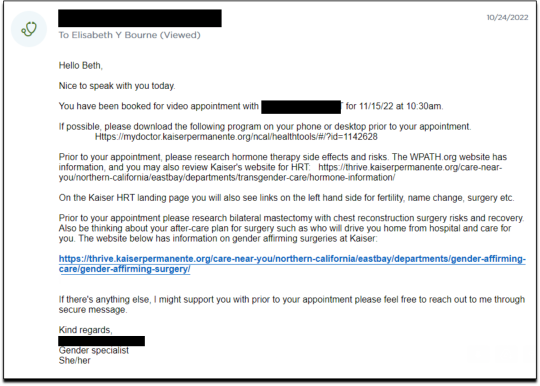
I decided to request a “gender-affirming” double mastectomy and phalloplasty. Kaiser sent me a sample timeline for gender transition surgery preparation (see below) that you can use as a reference for the process. I also asked for a prescription for cross-sex hormones (testosterone) as needed and recommended by Kaiser.
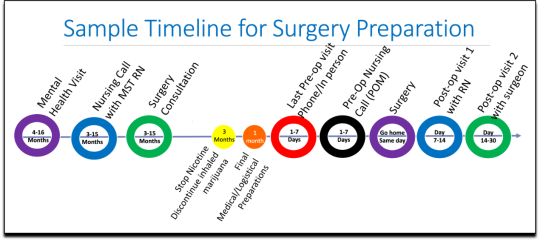
[ Source: Kaiser Permanente, Top Surgery - EXPLORING YOUR SURGICAL OPTIONS ]
Pre-Surgery Mental Health Video Appointment, Part I
This “Mental Health Visit” assessment was conducted over Zoom. The Kaiser gender specialist started with questions addressing my marital status, race, gender identity, and other demographics. She asked whether I was “thinking of any other surgeries, treatments in the future.” The list she read included “gender-affirming” hysterectomies, bottom surgeries such as metoidioplasty and phalloplasty, vocal coaching, support groups, and body contouring. “Anything else you might be interested in doing?” she asked. I said that I’d perhaps be interested in body contouring. I was also assured that all the procedures would be covered by insurance because they were considered “medically necessary.”
I dropped in several red flags regarding my mental health to see the reaction, but all were ignored. For instance, I revealed that I had PTSD. When the therapist asked me about whether I had experienced any “childhood trauma,” I explained that I grew up in Mexico City and had been groped several times and had also witnessed men masturbating in public and had been grabbed by men in subways and buses. “I was a young girl, so [I had] lots of experiences of sexual harassments, sexual assault, just the kind of stuff that happens when you are a girl growing up in a big city.” “So, you know,” I finished, “just the general feeling that you are unsafe, you know, in a female body.”
The therapist did not respond to my disclosure that trauma could be the cause of my dysphoria. Instead of viewing this trauma as potentially driving my desire to escape my female body through hormones and surgery, she asked whether there is anything “important that the surgery team should be aware of” regarding my “history of trauma,” such as whether I’d be comfortable with the surgeon examining and marking my chest prior to surgery.
When asked about whether I had had any “psychotic symptoms,” I told her that while I had had no such symptoms, my mother had a delusional nervous breakdown in her 50s because she had body dysmorphia and became convinced she had a growth on her neck that needed to be removed. I told her that my mother was then admitted to an inpatient hospital for severe depression. I asked her whether she ever sees patients with body dysmorphia and whether I could have potentially inherited that from my mother. She told me that psychosis was hereditary, but that it was “highly unlikely” that there was any connection between body dysmorphia and gender dysphoria.
I enthusiastically waved more mental health red flags, waiting to see if she would pick up on any of them.
I’m just wondering if my feelings, or perseverating, or feeling like these breasts make me really unhappy and I just don’t want them anymore!...I’m just not sure if that’s a similar feeling to body dysmorphia? How do you decide which one is gender dysphoria and general body dysmorphia, and just not liking something about your body? Feeling uncomfortable with your body?
And I did have an eating disorder all through college. I was a distance runner in college so I had bulimia and anorexia, you know. So I don’t know if that’s related to gender dysphoria?
The therapist replied, “I completely appreciate your concerns, but I am going to ask you questions about your chest, about your expectations. And then I’ll be able to give you an assessment.” She also said the main difference between my mom’s situation and mine was that my mom didn’t really have a growth on her neck, whereas it’s “confirmed” that I actually have “chest tissue.” Furthermore, she said that while “historically there has been all this pressure on patients to be like ‘Are you really, really sure you want hormones? Are you 100% sure?’ We are a little more relaxed.” She continued, “As long as you are aware of the risks and the side-effects, you can put your toe in the water. You can stop ‘T’ [testosterone], you can go back and do it again later! You can stop it! You can stop it! You know what I mean?”
Because we ran out of time, I scheduled a follow-up phone meeting on December 27, 2022 with a different gender specialist to complete my mental health assessment for top surgery.
Pre-Surgery Mental Health Video Appointment, Part II
During this meeting, Guneet Kaur, LCSW, another Kaiser gender specialist (she/her/they/them pronouns) told me that she regretted the “gatekeeping vibe” of the meeting but assured me that since I have been “doing the work,” her questions are essentially just a form of “emotional support” before talking with the medical providers.
She asked me about what I’d been “looking into as far as hormones.” I told her that I’d be interested in taking small doses of testosterone to counterbalance my female feelings to achieve “a feeling that’s kind of neutral.”
When she asked me about me “not feeling like I match on the outside what I feel on the inside,” I dropped more red flags, mentioning my aversion to wearing dresses and skirts.
I don’t own a single dress or a skirt and haven't in 20 years. I think for me it’s been just dressing the way that’s comfortable for me, which is just wearing, jeans and sweatshirts and I have a lot of flannel shirts and, and I wear boots all the time instead of other kinds of shoes. So I think it’s been nice being able to dress, especially because I work from home now most of the time that just a feeling of clothing being one of the ways that I can feel more non-binary in my everyday life.
She responded, “Like having control over what you wear and yeah. Kind of that feeling of just, yeah, this is who I am today. That’s awesome. Yeah.”
She then asked me to describe my dysphoria, and I told her that I didn’t like the “feeling of the female form and being chesty,” and that because I am going through menopause, I wanted to start taking testosterone to avoid “that feeling of being like this apple-shaped older woman.” “Good. Okay, great,” she responded, reminding me that only “top surgery,” not testosterone, would be able to solve my chest dysphoria. (Perhaps it was because all these meetings were online, they didn’t notice I’m actually fit and relatively slender at 5’-5” and 130 pounds, and not apple-shaped at all.)
She told me that we had to get through a few more questions related to my medical history before “we can move on to the fun stuff, which is testosterone and top surgery.”
The “fun stuff” consisted of a discussion about the physical and mood changes I could expect, and her asking me about the dose of testosterone I wanted to take and the kind of “top surgery” technique I’d prefer to achieve my “chest goals.” She told me that all or most of my consultations for surgeries and hormones would be virtual.
The gender specialist told me after the appointment, she would submit my referral to the Multi-Specialty Transitions Clinic (MST) team that oversees “gender expansive care.” They would follow up to schedule a “nursing call” with me to review my medical history, after which they’d schedule my appointment with a surgeon for a consultation. Her instructions for this consultation were to “tell them what you’re wanting for surgery and then they share with you their game plan.”

[ Decision-making slide to help me identify my goals for top surgery–flat chest, nipple sensation, or minimal scarring. Source: Kaiser Permanente, Top Surgery - EXPLORING YOUR SURGICAL OPTIONS ]
She told me that Kaiser has a team of plastic surgeons who “only work with trans and nonbinary patients because there’s just so much need for them.” She asked about my priorities for chest surgery, such as whether I value flatness over nipple sensation. I learned about double incision top surgery with nipple grafts, as well as “keyhole,” “donut,” “buttonhole,” and “Inverted-T” top surgeries.
By the end of the hour-long appointment, I had my surgery referral and was ready for my “nursing call” appointment.
Nursing call with Nurse Coordinator from the Transgender Surgery and Gender Pathways Clinic at Kaiser San Francisco
On January 19, 2023, I had my nursing call with the Nurse Coordinator. He first said that “the purpose of this call is just for us to go through your chart together and make sure everything’s as accurate as possible.” Once that was done, my referral would be sent to the surgeon for a consultation.
He asked me about potential allergies and recreational drug use, and verified that I was up to date on mammograms, pap smears, and colon cancer screenings, as well as vaccines for flu and COVID. I verified my surgical history as well as my current medications and dietary supplements.
He told me about a “top surgery class” available for patients where one of the Kaiser surgeons “presents and talks about surgical techniques and options within top surgery,” and includes a panel of patients who have had top surgery. I signed up for the February 8th class.
Within 10 minutes he told me that he had “sent a referral to the plastic surgery department at Kaiser Sacramento,” and that I should be hearing from them in the next week or two to schedule a consultation.
Appointment for Testosterone
On January 27, I had a 13-minute online appointment with a primary care doctor at Kaiser Davis to discuss testosterone. The doctor verified my name and preferred pronouns, and then directly asked: “So, what would you like to do? What kind of physical things are you looking for?”
I told her I wanted facial hair, a more muscular and less “curvy” physique, and to feel stronger and androgynous. She asked me when I wanted to start, and I told her in the next few months. She asked me if I was menopausal, whether I had ovaries and a uterus, although that information should have been on my chart.
The doctor said she wanted me to come in to get some labs so she could check my current estrogen, testosterone, and hemoglobin levels before starting hormones. Then “we'll set the ball in motion and you'll be going. We’ll see you full steam ahead in the direction you wanna go.”
That was it. I made an appointment and had my lab tests done on February 12. My labs came back on February 14, and the following day, after paying a $5 copay at the Kaiser pharmacy, I picked up my testosterone pump. That was easy!
Top Surgery Consultation
On the same day I received my labs, I had a Zoom surgery consultation with Karly Autumn-Kaplan, MD, Kaiser Sacramento plastic surgeon. This consultation was all about discussing my “goals” for surgery, not about whether surgery was needed or appropriate.
I told the surgeon that I wanted a “flatter, more androgynous appearance.” She asked me some questions to get a better idea of what that meant for me. She said that some patients want a “male chest,” but that others “want to look like nothing, like just straight up and down, sometimes not even nipples.” Others still wanted their chest to appear slightly feminine and only “slightly rounded.” I told her that I’d like my chest to have a “male appearance.”
“What are your thoughts about keeping your nipples?” she asked. “Are you interested in having nipples or would you like them removed?” I told her that I’d like to keep my nipples, but to make them “smaller in size.” She asked me if I’d like them moved to “the edge of the peck muscle” to achieve “a more male appearance.” I said yes.
I was asked to show my bare chest from the front and side, which I did. Then she asked me how important it was for me to keep my nipple sensation. I replied that it was important unless it would make recovery more difficult or there were other associated risks. She highlighted the problem with the free nipple graft, saying that removing the nipple to relocate it means “you're not gonna have sensation in that nipple and areola anymore.” However, some nipple sensation could be preserved by keeping it attached to “a little stalk of tissue” with “real nerves going to it,” but that would require leaving more tissue behind. I told her I’d go for the free nipple graft to achieve a flatter appearance. It was also suggested I could skip nipple reconstruction entirely and just get nipples “tattooed” directly onto my chest.
She told me I was “a good candidate for surgery,” and put me on the surgery wait list. She said that the wait time was between three and five months, but a cancellation could move me up to a sooner date. Also, if I wanted surgery as soon as possible, I could tell the surgery scheduler that I’d be willing to have any of the other three surgeons perform my mastectomy. Outpatient top surgery would cost me a copay of $100.
They contacted twice, in February and March, notifying me of cancellations. If I had accepted and shown up on those dates, they would have removed my breasts. This would have been less than five months from the time I first contacted Kaiser to inform them of my new “nonbinary” gender identity.
How Far Can I Go?
I decided to see how easy it would be for me to get approved for a phalloplasty. Known euphemistically as “bottom surgery,” phalloplasty is the surgical creation of an artificial penis, generally using tissue from the thigh or arm.
I sent an email on March 1, 2023, requesting to have a phalloplasty and concurrent hysterectomy scheduled alongside my mastectomy.
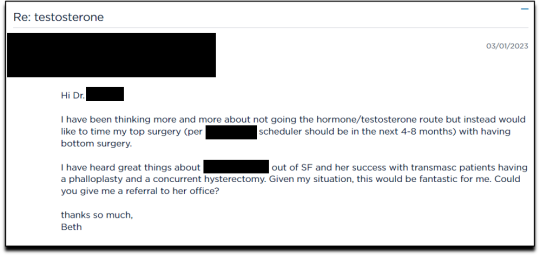
Two weeks later, on March 16th, I had a 16-minute phone call with a gender specialist to discuss my goals for bottom surgery and obtain my referral.
During the call, I explained to the specialist that I wasn’t sure about taking testosterone anymore because I was already quite athletic and muscular, and that taking testosterone didn’t make much sense to me. Instead, I wanted bottom surgery so that I wouldn’t feel like my “top” didn’t match my “bottom.” I told her:
But what I really wanted was to have bottom surgery. So this way when I have my top surgery, which sounds like it could be very soon, that I’ll be aligned, that I won’t have this sense of dysphoria with one part of my body and the other part feeling like it matched who I am. So yeah. So I just did a little bit more research into that. And I looked at the resources on the Kaiser page for the MST clinic and I think I know what I want, which is the hysterectomy and then at the same time or soon after to be able to have a phalloplasty.
I told her that I wanted to schedule the top and bottom surgery concurrently so that I wouldn’t have to take more time off work and it would save me trips to San Francisco or Oakland, or wherever I had to go for surgery.
None of this gave the gender specialist pause. After a brief conversation about some online resources to look over, she told me that she would “submit the referral now and we’ll get this ball rolling.”
Bottom surgery would cost me a copay of $200, which included a couple of days in the hospital for recovery.
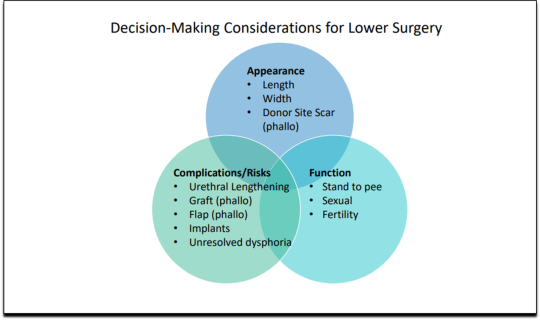
Phalloplasty Surgical Consultation with Nurse Coordinator
On May 16, 2023, I had a short surgical consultation with a nurse coordinator to go through my medical history. This was similar to the consultation for top surgery but included information about hair removal procedures for the skin on my “donor site” that would be fashioned into a makeshift penis. They also went over the procedures for determining which donor site—forearm or thigh—was more viable.
After only 15 minutes, she submitted my referral to the surgeon for another surgical consultation.
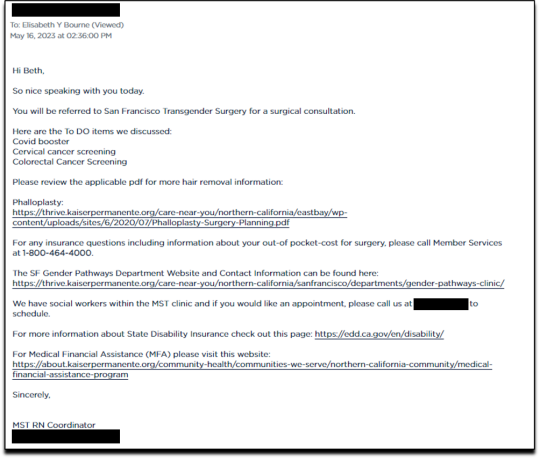
On May 25 I received an email from my phalloplasty surgeon’s scheduler, informing me that they have received my referral and are actively working on scheduling, but that they are experiencing delays.
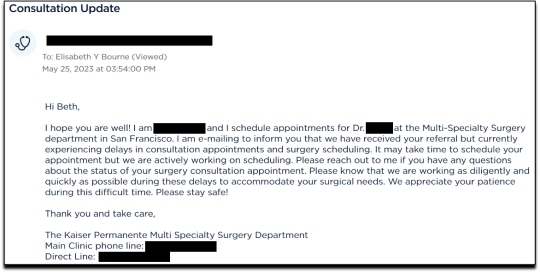
I ended my investigation here once I had the referral for the top and bottom surgery. I never used my testosterone pump.
Final Thoughts
In fewer than 300 days, based on a set of superficial and shifting thoughts about my gender and my “embodiment goals” triggered by the mere mention of “gender” in a form letter from my primary care physician, and driven by what could only be described as minor discomforts, Kaiser Permanente’s esteemed “multi-disciplinary team” of “gender specialists” was willing, with enthusiasm—while ignoring mental health concerns, history of sexual trauma, and rapidly escalating surgical requests—to prescribe life-altering medications and perform surgeries to remove my breasts, uterus, and vagina, close my vaginal opening, and attempt a complex surgery with high failure and complication rates to create a functionless representation of a penis that destroys the integrity of my arm or thigh in the process.
This describes the supposedly meticulous, lengthy, and safety-focused process that a Kaiser patient must undergo to embark on a journey to medically alter their body. No clinician questioned my motivations. No one showed concern that I might be addressing a mental health issue through radical and irreversible interventions that wouldn’t address my amorphous problems. There were no discussions about how these treatments would impact my long-term health, romantic relationships, family, or sex life. I charted the course. The clinicians followed my lead without question. The guiding issue was what I wanted to look like.
No other medical field operates with this level of carelessness and disregard for patient health and welfare. No other medical field addresses issues of self-perception with surgery and labels it “medically necessary.” No other medical field is this disconnected from the reality of the patients it serves.
Kaiser has traded medicine for ideology. It’s far beyond time we stop the ruse of considering “gender-affirming” interventions as anything approaching medical care.
This isn’t the first time Kaiser Permanente has been in the news for completely disregarding medical safeguards in the name of “gender-affirming care.” As girls, Chloe Cole and Layla Jane became convinced that they were born in the wrong body and were actually boys on the inside. Doctors at Kaiser ignored their underlying conditions and instead prescribed testosterone and removed their breasts. Both Cole and Jane have since detransitioned and are currently suing Kaiser.
The fact that children and vulnerable adults are being exploited in this massive ideological experiment is not just tragic; it’s deeply disturbing, especially considering it has evolved into a billion-dollar industry.
I hope that by sharing my story, I can bring more focused scrutiny to the medical scandal unfolding not just at Kaiser but also at medical centers and hospitals across the Western world. These institutions have completely abandoned medical safeguards for patients who claim to be confused about their “gender,” and I aim to awaken more parents and assist them in protecting their children.
--
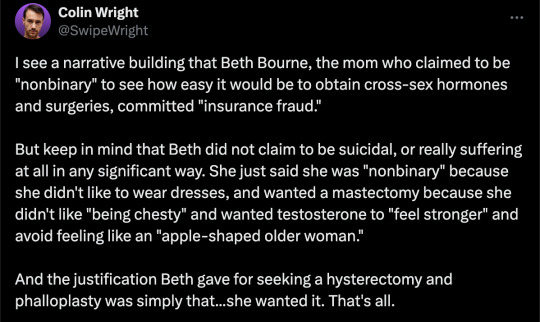
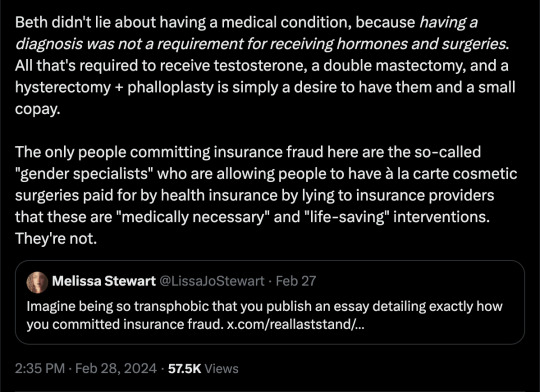
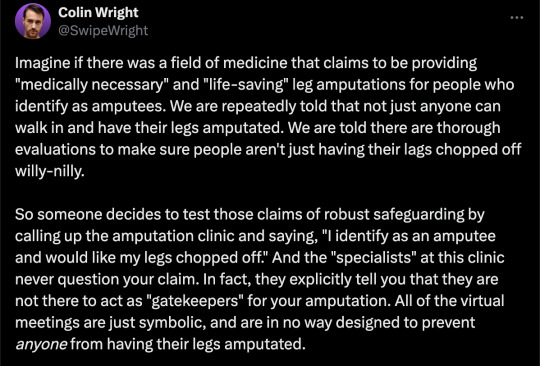
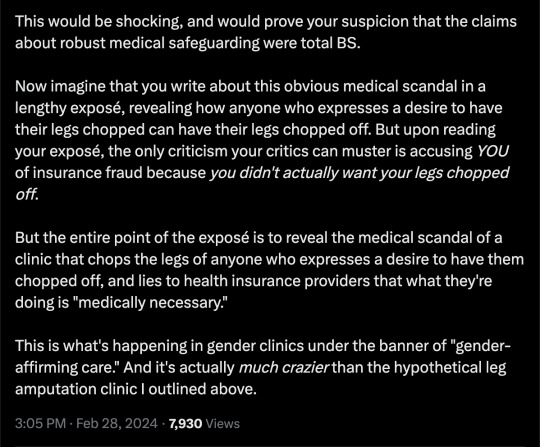
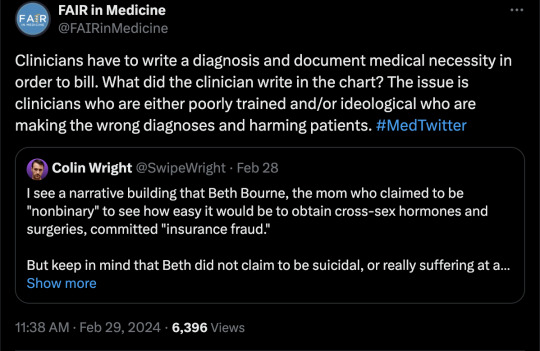
==
This is completely insane.
Apologists online are running around saying, but she didn't mean it, she was lying, she was pretending...
It doesn't matter.
Any kind of security, penetration or integrity test is insincere too. When security researchers compromise Microsoft's operating system or Google's browser or whatever, "but they didn't mean it" is not a defence to a discovered security flaw. It doesn't matter that the security researchers didn't plan to steal data or money or identities. The flaw in the system is there regardless.
It doesn't matter that it was insincere. Because the workers didn't know that. They never checked, never asked questions, never tested. They had been taught and instructed to never ask any questions. They did what they were supposed to. And the system failed spectacularly. Because that's what "gender affirming care" means.
Additionally, the claim that Beth Bourne committed fraud is an outright lie. A patient cannot bill. They do not have the authority. The medical clinic is the only one that can bill, and they must supply a diagnosis and a medical necessity.
If they didn't diagnose her and just wrote down what she said, then they committed fraud. If they claim they did diagnose her, then they committed fraud, because the diagnosis they concocted was bogus. This, by the way, is actually going on. Clinics are reporting fake endocrine and other disorders to get blockers, hormones and other interventions. Jamie Reed and other whistleblowers have documented evidence of this. Beth Bourne is not responsible for what the clinic does. They have medical licenses and legal responsibility. Not her.
Additionally, anyone who actually read the article would know how she tested the system. She said things like, "I've always been not that feminine. So, maybe I get my boobs removed." And they said, "sure." Instead of saying, "wait, why do you think that?" Framing it as her lying is itself a lie. They violated their ethical obligations. That much is incontrovertible. And it's directly the result of "gender affirming care," where clinics and clinicians rubber-stamp anything deemed "trans" based entirely on ideological, not medical, grounds.
#Beth Bourne#undercover#undercover investigation#gender identity ideology#queer theory#nonbinary#non binary#top surgery#bottom surgery#double mastectomy#bilateral mastectomy#gender affirming care#gender affirming healthcare#gender affirmation#affirmation model#medical scandal#medical malpractice#medical corruption#religion is a mental illness
747 notes
·
View notes
Text
me: hey I need a doctor to prescribe and then manage my adhd meds
multiple healthcare websites: oh! you are a child!
me: what
healthcare websites: you're looking for pediatrics! or adolescent behavioral health! 😊 do you need a note for school? 😉 are you perhaps an 8-12yo who can't focus on his homework? 🤔 are you disrupting the classroom environment? do you either hate reading or super love it?
me: ...
healthcare websites: or maybe you're a mom! is your kid just the worst? are you just so exhausted and overwhelmed from how hard it is to be a parent to a child who has Needs™? you must be a mom!
me: pleaes...I'm begging you...
#personal#sbs rambles#adhd#mental health#the healthcare system is in shambles#I just need meds so I don't lose my mind pls
868 notes
·
View notes
Text
Ohio's mental health authority is trying to ban transgender healthcare - esp for people under 21 years of age, BUT they are asking for public input! Hurry, though, as it's only through 5pm local time (US Eastern Standard Time) on January 19th!
Changes to the Ohio Department of Mental Health and Addiction Services rule, "5122-14-12 | Private Psychiatric Hospital: Program, Specialty Services, and Discharge Planning", are to prohibit any kind of transgender care for those under 21 in a psychiatric hospital. Full document here, but be aware it is to a pdf

The rule includes the text, "Medical services shall not include any of the following: ...the prescribing, administering, or furnishing of any prescription drug or hormone...", which means if someone under 21 enters a private psychiatric hospital and who is already on puberty blockers or hormones, the doctors there would be prohibited from giving them the prescription they already have.
A new proposed rule for the same Ohio department, "5122-26-19 | Gender Transition Care" states the requirements for anyone needing transition care under this department. They are targeting the most vulnerable with these rules: young people who have mental health issues who also need transgender care. Full document here, but be aware it is to a pdf
Included in this rule: A doctor may only provide transgender care after three requirements have been met - a psychiatrist who has experience with the patient's age group must be employed by/contracted with the provider, an endocrinologist who has experience with the age group, and the provider has a comprehensive written plan that includes a detransitioning provision.
It also requires any such patient to have a thorough mental health evaluation and counseling period of at least 6 months prior to any transgender care. It also appears to become part of their medical record.

In addition to a ban on any transition surgeries, even if the patient jumps through all of those hoops, is a curious item that prevents doctors from referring patients out to other doctors that can provide care:

Another thing that made me pause was what seems like a scare tactic:

The terms "orchiectomy" and "penectomy" mean the removal of testicals and penis, respectively. The word "castration" could only be redundant or referring only to chemical castration, which seems to not fit in with gender reassignment surgery (correct me if you know it does fit). "Castration" is a scary word for most people with penises. I think it would likely provoke a knee-jerk response, like, "Oh, no, castration is bad. No castration! Enact these rules to keep people from being castrated!"
⚠️ The time is now to tell the Ohio Department of Mental Health and Addiction Services what you think about this! ⚠️
The option to comment on these needless restrictions can be found at the link in the first paragraph, but it's just an link that takes you to your email app. You can also just email them directly at [email protected] no later than 5 pm EST on Friday, January 19, 2024.
Please reblog to get this message out! We all have a stake in how rules and laws are enacted. They often lead to more in other states/countries. So, even if you don't have a stake in this personally, please make sure others see it.
Why do I care? I don't live in Ohio, but I have friends all over, including Ohio, who need transgender care. You might know someone like that, too.
#transgender#trans healthcare#ohio#ohio law#lgbtq+#comment#comment period#mental health#transition#transitioning#transgender healthcare ban#ban
449 notes
·
View notes
Text
Palestinian activists in Ontario are asking you to email your reps about Bill 166. The wording of the bill is extremely vague, but it seems like the Ford government wants to open itself the possibility to meddle in mental health services provided by Universities and to change their anti-racism policies. It is very likely - with the timing - that these policy changes are going to be saught to arrest / institutionalize Palestinians for divulge during therapy, or to deny them service altogether. They want to control University campus mental healthcare, something no other province does.


@newsfromstolenland, @vague-humanoid
#cdnpoli#Ontario#post secondary education#mental healthcare#zionism#Bill 166#Doug Ford#Progressive Conservatives#Conservatives#fascism
326 notes
·
View notes
Text
September is PCOS Awareness month, and I'd like to point out some of the many symptoms people with PCOS deal with everyday...
moon face
excessive body hair, arm, chests, back, face, legs and buttocks
irregular periods
painful periods
extremely heavy periods
constant bloating
mood swings
struggle to lose weight
struggle to gain weight
food cravings
high cholesterol
insulin resistance
oily skin
acne
insomnia
fatigue
sleep apnea
depression
anxiety
tubular breasts
dark and sensitive underarms
skin tags
belly fat
high testosterone
excessive hair loss
thinning hair
pelvic pain
infertility
ovarian cysts
And so much more, as well as having to struggle to even find a doctor who will take any of our symptoms and pain seriously. The medical industry needs to take better care of women, intersex and trans folks with PCOS and Endometriosis.
Our pains are real and we deserve better.
#pcos#pcosawareness#pcossupport#pcosjourney#endometriosis#endometriosis awareness#endometriosissupport#chronic illness#chronic pain#chronically ill#mental illness#healthcare#intersex#transgender#support#awareness
1K notes
·
View notes
Text


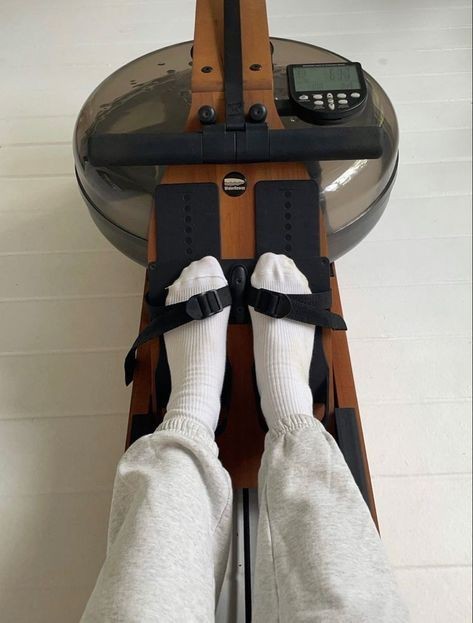


#it girl#that girl#just girly things#clean girl#wellness girl#pink pilates princess#pilates princess#pilates aesthetic#pilates girl#yoga pilates#wellness and beauty#wellness and health#wellness blog#health and wellness#wellness#healthy food#healthy eating#healthy#healthy living#mental health#healthcare#health & fitness
348 notes
·
View notes
Text






🌞🌞🌞
#aesthetic#wellness#mental health#2014 revival#2016 aesthetic#2016 tumblr#girly blog#pink pilates princess#2014 nostalgia#2014 girly#gossip girl#bring back 2014#cleancore#clean moodboard#clean girl#healthcare#health and wellness#health & fitness
310 notes
·
View notes
Text

i'm 22 years old and they've made telehealth testosterone illegal for everyone in my state. i've been getting my medication this way through plume for almost 3 years and now i have to find an in person clinic? how fucking dare they. i'm devastated. there is no good reason for T to be a class 3 substance other than to make life harder for men like me. FUCK everyone who had anything to do with this legal decision, i hope they die horribly and are mourned by no one.
#i struggle with in person appointments due to mental health issues#i feel legally violated right now#being trans in alabama is all fine and good for me 90% of the time and then they go and do some bullshit like this#my mental state is in the toilet right now#trans rights#trans healthcare
741 notes
·
View notes
Text
anxiety, depression and/or being mentally and/or physically exhausted should always be a valid reason for any employee to take a day off without their paycheck being affected in any way, and also for any student to take a day off without their grade being affected in any way by the way
#important#mental health#mental health awareness#mental health support#important psa#psa#politics#healthcare#medical care#student#studyblr#career#business#capitalism#studying#study#career growth#career goals#political#news#tumblr
384 notes
·
View notes
Text
Signs to tell if the person in your inbox, asking you to reblog a post with a link asking people to donate money for their sick pet or kid, is a scam
Before we start, a disclaimer that this is NOT a solid confirmation that this person must be a scammer. The intention of this is for you to be wary and always check before donating or rebloging this type of post.
Without further ado and from firsthand experience, here are the red flags:
The person in your inbox asking you to reblog a post with their donation link will always ask you NOT to publish the ask they sent you (but to only reblog their post), and their reasoning would always be something along the line of “I don’t want people to think I pressured you into doing it🥺”
But if you go to the person’s profile with their post asking for donation, 100% of the time, you’ll find that the account has only just been created days ago. — How can you tell this? Easy. You can literally scroll down to the first ever post of their blog in less than 10 seconds.
The thing these scammers have in common is that they will create a new blog and they WILL reblog some general posts, such as fandom posts, to make their blogs look legit. They will have legit profile pictures so they don’t look like bots. But it will always be a newly created blog with several reblogs (mostly about fandoms, because they know rebloging fandom posts will make them look more legit than if they were to reblog some suggestive photos of some women, since the latter will make them look like p0rn bots), and the only original post they made is that post asking for donation.
Move on to the information they provided about their sick pet or kid. They will provide thorough and detailed information to make it look legit. But the thing is that they could just take that from google or steal that information from someone who actually needed the donation. There is never a way to tell if your money will go directly to help save the pet or the kid. My advice is to google the patient’s name and see how old the case is, if the case of this patient with this name and this information has been used to ask for donation by other people before, etc.
The photo of the patient they gave can also help you determine if it’s legit. Save that photo and then use google image search to see if it’s an original photo or if it’s a stolen one that has been used before.
Bonus: the thing these scammers can’t do is provide updates about how the patient’s doing. So it’s only just one post with the link asking you for your money. If it is legit, you should be able to see consistent updates of how this patient is doing or if there’s any change, etc. (I’m not saying it’s a requirement for those whose loved one is in critical care to post updates on social media all the time, I’m simply pointing out that scammers tend to fail to provide any update because they can’t.)
I’ll always encourage donating and helping spread the posts of those who actually are in need, though it’s just so unfortunate that, while there are people who are genuinely struggling, there are a lot of scammers out there looking for an opportunity to take advantage of people’s kindness and using sick pet or kid as a way to scam people and making it more difficult for people who really need help to be taken seriously.
Last but not least, fuck those scammers. Stay safe y’all.
#important#psa#important psa#b00st#signal b00st#signal boost#useful information#useful tips#life tips#healthcare#mental health#mental health awareness#self care#self love#tumblr#mental health care#positivity#life lessons#life coaching#life hacks
169 notes
·
View notes